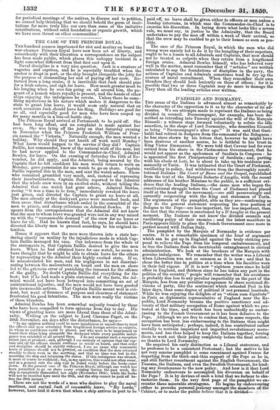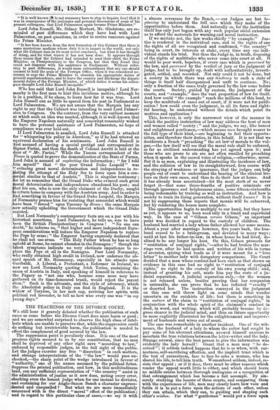D'.AZEGLIO AND NORMANBY.
THE cause of the Italians is advanced almost as remarkably by the character of the opposition to it as by the character of its ad- vocates. We see attempts made to represent the Italians as being divided in council. Buoncompagni, for example, has been de- scribed as intruding into Tuscany against the will of the Marquis Rioasoli : a witness steps forward voluntarily to refute the idle assertion, in the shape of Lord Normanby, who describes Ricasoli as being " Buoncomp i's alter ego." It was said that Geri- al baldi had retired in dudgeon from the command of the Bolognese : he has sinoe shown by 's letters that, however he might have been desirous of another course, he is faithful to his trust in King Victor Emmanuel. We were told that Cavour had for ever retired from his share in the Piedmontese Government, that he would not appear as the spokesman of Sardinia in Congress : he is appointed the first Plenipotentiary of Sardinia; and, parting with his abode at Len, he is about to take up his residence per- manently at Turin. It was intimated that the Court of Piedmont, vacillating in policy, had withdrawn front the thoroughly consti- tutional Italians : the Court of Rome and the Gospel, republished from the text of the Marquis Roberto d'Azeglio, with the recent addresses of his brother Massimo to the public, is a sufficient evi- dence that the leading Italians —the same men who began the constitutional struggle before the Court of Piedmont had placed itself at the head of the movement,—are still perseveringly and earnestly cooperating with the King and statesmen of Turin. The arguments of the pamphlet, able as they are—confirming as they do the general statement respecting the true position of Bologna to the Pope—are less important, far less important, than the fact that the reissue is sanctioned by a D'Azeglio at the present moment. The Italians do not know the divided councils and vacillating policy of their enemies ; and the latest manifesto in Paris appears likely to place the French Government once more in perfect accord with Italian Italy. The pamphlet by the Marquis of Normanby is evidence per contra. It is a remarkable specimen of the kind of argument which can be got up in England against the truly striking pro- posal to relieve the Pope from his temporal embarrassment, and to free the Italians from the inextricable entanglement in clerical administration. We look at the brochure of the Marquis with genuine indulgence. We remember that the writer was a Liberal when Liberalism was not so common as it is now; and that he chose the better line in politics at a time when his faculties were in their full vigour. If it is now "eighteen years since he held office in England, and thirteen since he has taken any part in the politics of the country," people will remember that his avoidance is probably due less to any peculiar impartiality on the part of the Marquis, km from any peculiar repugnance to share sectional di- visions of party, like the sentiment which actuated Peel in his later days, than some degree of political if not personal lassitude. While he was enjoying the delights of an " otium cum dignitate" in Paris as diplomatic representative of England near the Re- public, Lord Normanby became the positive sanctioner and ad- vocate of that military occupation of Rome against which we pro- tested at the time, and which has been undoubtedly as embar- rassing to the French Government as it has been delusive to the Pope. Although we are free to confess that, in some respects, the occupation has been less embarrassing to the Italians than might have been anticipated ; perhaps, indeed, it has contributed rather usefully to restrain impatient and imperfect revolutionary move- ments, and has thus helped to keep the Italians together, forcing them to work out their policy completely before the final action ; no thanks to Lord Normanby. He acquired his early .distinction as a Liberal statesman and he professes to be a consistent Protestant; but the motive statesman, his not very concise pamphlet is some resentment against France for departing from the thick-and-thin support of the Pope as he is, aild still further resentment against the English Government, the Tuscans, the Italians, and even the Swedish Government, for lend- ing any (-Countenance to the new policy. And how is it that Lord Normanby endeavours to accomplish his diversion on behalf of the Pope ? It is by devices of such a kind that we forbear to cha- racterize them. In the very first page of the pamphlet we en- counter these miserable stratagems. He begins by endeavouring either to provoke personal jealousy amongst the members of the Cabinet, or to make the public beliere that it is divided— -
"It is well known (ft is not necessary here to stop to inquire how) that it was in consequence of the jealousies ana personal dissensions of some of his present colleagues, that Lord Palmerston again became Prime Minister."
Lord John Russell, Mr. Sidney Herbert, Mr. Gladstone, are re- minded of past differences which they have had with Lord Palmerston' on past questions, in order to revive rancours against the Prime Minister.
"It has been known from the first formation of this Cabinet that there is some mysterious medium whose duty it is to impart to the world, not only what the Cabinet does in its most secret conclaves, but what it has thought of doing, and for what reason it has not been done. It appears through these means that the Cabinet had intended to send their chief, the Prime Minister, as Plenipotentiary to the Congress_, but that they found they could not dispense with his assistance in Parliament. Without refer- ring to past differences, it would seem extraordinary that any one should consent to hold the seals of the Foreign Office, when it was considered ne- cessary to urge the Prime Minister to abandon his appropriate duties of general superintendence, and to leave the country and discharge the depart- mental duties of the Foreign Minister, of which duties it seems his collea- gues thought Lord John Russell incapable."
Who has said that Lord John Russell is incapable? Lord Nor- manby is the first man to hint this invidious motive, although he is in a position, if he chose, to learn how far it was true. Lord John Russell can as little be spared from his seat in Parliament as Lord Palmerston. We are not aware that the Marquis has any right to say that the Cabinet was intending to send Lord Palmer- ston to Congress. On the contrary, from the very earliest moment at which such an idea was mooted, although it is well-known that the Emperor Napoleon naturally and somewhat reasonably wished to have the personal assistance of Lord. Palmerston, no hope of compliance was ever held out.
If Lord Palmerston is assailed, Lord John Russell is attacked for "whispering his policy in Aberdeen," as if he had uttered an equivocal declaration of his sentiments. Lord John Russell is first accused of having a special protégé and correspondent in Signor Farini, and then the death of Colonel Anviti is laid at the door of "Mr. Farini." While the Tuscan correspondent of the Times is quoted to prove the demoralization of the State of Parma, Lord John is accused of neglecting the information ; "for I told shim myself" that " the poor Grand Duke Leopold" was "evincing great moral determination and independence in re- sisting the attempt of the Holy See to force upon him a con- eordat similar to that of Austria." This is singular testimony ; ior let us remember that the Grand Duke who evinced such great Saoral determination and independence abandoned his post; and that his son, who is now the only claimant of the Duchy, sought to return home in company with the Austrian army. And 111 order to find something in favour of the Grand Duke Leopold, the Marquis of Normanby praises him for resisting that concordat which would have been "forced" upon Tuscany by .Rome; the same Marquis now actually upholding the Government which the Grand Duke resisted.
But Lord Normanby's contemporary facts are on a par with his historical assertions. Lord Palmerston, he tells us, was to have been the British Plenipotentiary in Congress ! "No one can doubt," he informs us, "that higher and more independent Euro- pean considerations will induce the Emperor Napoleon to replace the Pope by arms ; " the Emperor having expressly declared that he shall not use arms. "The Holy Father whom he has so long upheld at Rome, he cannot abandon in the Romagna ; " though the , latest symptoms indicate no very obstinate impatience to re- . place the Pope at all in the Romagna. Poor Lord Normanby, who really obtained high credit in Ireland, now endorses the ab- surd speech of Mr. Hennessey, especially in his attacks upon Garibaldi. A Liberal, a Protestant, a Reformer in Ireland, we now see Lord Normanby quoting Irish Tories, sustaining the cause of Austria in Italy, and speaking of himself in reference to the Papacy as "not one who, because some moss may have gathered on its time-honoured trunk, would reject the parent stem." Such is the advocate, and the style of advocacy' which the Absolutist policy in Italy can find in England. It is the t widow of Toryism, in her mob cap, reviving her spirits with political red lavender, to tell us how wise every one was "in my young days."



























 Previous page
Previous page